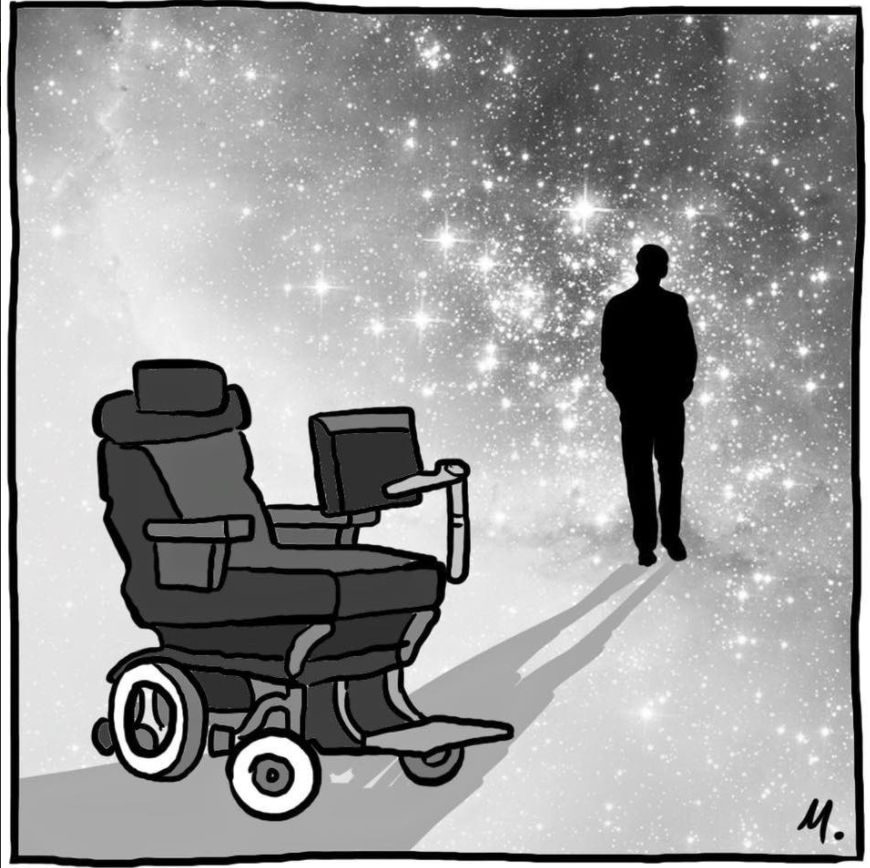
Famed scientist Stephen Hawking died earlier this week at the age of 76. He is largely regarded as one of the most important physicists in history. Of course, the tributes came pouring in. While most commemorated his genius and determination to transcend the debilitating effects of ALS, others attempted more nuanced commentary. Like USA Today which took Hawking’s death as opportunity to remind us of the physicist’s view that “Heaven is a fairy story.”
Hawking, who died at 76, spoke candidly in a 2011 Guardian interview about what he believes happens when people die. He told the Guardian that while he “wasn’t afraid of death,” he was in no hurry to die.
“I regard the brain as a computer which will stop working when its components fail,” he said. “There is no heaven or afterlife for broken down computers; that is a fairy story for people afraid of the dark.”
It should come as no surprise that Hawking was not religious. In Hawking’s 2010 book, The Grand Design, Hawking said a creator is “not necessary” in the narrative of how the world was created.
While such an approach — eulogizing Hawking by highlighting his disbelief in an afterlife — has sticky philosophical ramifications, others chose to have a little fun with it. Like God (on Twitter).

Not sure if God knows that Hawking believed that heaven was “a fairy story.” Then again, when God tweets that “The Bible is the fakest news of all” it’s probably safe to assume that someone hacked his account.
There were others, however, who mourned Hawking’s profession of atheism and the (according to critics) squandering of his talents on a philosophy that ultimately rendered his accomplishments moot.
For example, Franklin Graham, President of Samaritan’s Purse and the Billy Graham Evangelistic Association, took to Facebook with his sympathies:
“I wish I could have asked Mr. Hawking who he thought designed the human brain. The designers at HP, Apple, Dell, or Lenovo have developed amazing computers, but none come even close to the amazing capabilities of the human mind. Who do you think designed the human brain? The Master Designer — God Himself. I wish Stephen Hawking could have seen the simple truth that God is the Creator of the universe he loved to study and everything in it.”
Another active “opponent” of Hawking’s Naturalistic worldview was Ken Ham, who was more blunt about his perspective at Hawking’s passing:
“A reminder death comes to all. Doesn’t matter how famous or not in this world, all will die & face the God who created us & stepped into history in the person of Jesus Christ, to die & be raised to offer a free gift of salvation to all who receive it.”
Christopher Benek, pastor and clergy expert on artificial intelligence and global emerging tech and theology, attempted to balance condolence with theological reality by tweeting:
Stephen Hawking will definitely be missed. He was one of the great minds in human history. But Hawking wasn’t right about everything. His perpetuation of Escapism Theology in culture was based in fear – not in Love, Redemption and Renewal.
As you can imagine, such criticisms of Hawking were on the receiving end of much scorn. A good example was Relevant Magazine’s calling out of evangelist Ray Comfort.
Comfort wrote, “When renowned theoretical physicist Stephen Hawking died yesterday, I posted a link to a secular news article on my Facebook page. It was big news and, of course, very sad. On the top of the news item I put another link, to one of our free films that have been seen by millions. It just said: EvolutionvsGod.com. Nothing else was stated.”
He then explains, “To my surprise, my page was flooded with angry atheists, who were abusing me with comments that would make a cat’s tail curl. It was as though I had blasphemed their holy prophet.”
Even though he says he was “surprised” by angry comments from atheists, the rest of his post shows why so many might be angry at him: Hawking had only been dead for hours, and his death was being used as a tool to promote a film. And instead of thoughtfully engaging any kind of argument, he got reductive and, frankly, said things that were simply in poor taste. The man had literally just died.
The author/editor of this piece, like many of those who were angered by mentions of Hawking’s atheism, seems far less concerned with extrapolating the implications of the deceased physicist’s worldview than taking to task critics with a poor sense of timing.
Comfort expounds upon the obvious, and this is what has many fans of Stephen Hawking up in arms:
“It’s an irony that atheists are upset about anyone’s death. According to their beliefs, Stephen Hawking was just an animal. He had no more worth than a dog. They believe (as he did) that overpopulation is a problem, and his death made room for other animals. His life had no purpose, rhyme or reason. He was just a tiny insignificant speck in the universe. Atheism at best is heartless and cruel.”
Is it inappropriate to point out this irony? Frankly, so many tributes of Stephen Hawking undermine or openly contradict the worldview he espoused.
For instance, NASA commemorated Hawking with the words: “May you keep flying like superman in microgravity.” Another offered these condolences: “For he now looks from above.” However, as a Materialist, there would be no “above” that “superman” could look down from after his death. That would, indeed, be the “fairy tale” Hawking rejected. Even the term RIP has no logical meaning to the atheist. (Hawking’s death spawned a #RIPStephenHawking hashtag.) However, Hawking can’t “rest in peace” because he doesn’t exist in order to rest.
Then there was this image floating around the web:

Again, while Hawking is, indeed, free of his wheelchair, in what sense is he “free”? Does he know he’s free? If so, that means he is self-aware. Yet as a Materialist, Hawking would likely believe that his molecular structure would simply disassemble and his essence return to the star stuff. If his being reconstituted in some other form or dimension, then that would imply he was wrong about there being “no heaven or afterlife.” If so, what else was he wrong about?
Sure, timing is important. But so is pointing out the dangerous, nonsensical logic of Naturalism.
If Hawking was right, he simply powered off like an old computer. His components failed and he was gone. Though his memory may temporarily “live on,” it will ultimately come to nought as the cold, vast Universe swallows all that is. Stephen Hawking’s own worldview diminishes the import of his life, discoveries, and worth. Materialism ultimately renders his memory and discoveries moot.
Truth is, Hawking spent most of his life turning people away from God and the Bible. It’s appropriate that we recognize his genius and determination. But let’s also acknowledge the incredible inconsistency of the worldview he espoused. Only a supernatural view of life, a non-materialistic view of life, can bestow the appropriate honor and dignity upon Stephen Hawking, or any human for that matter! Without it, he is just a bag of chemicals on an infinitesimal speck in an impersonal Universe that is moving towards extinction.
Hawking once said, “The greatest enemy of knowledge is not ignorance, it is the illusion of knowledge.” Sadly, that applies to our “knowledge” of the afterlife as well.















Wow. Thanks for bringing together all the commentaries.
Hawking was brilliant by many standards, but what if he had kept the mind of a child?
Such is the mystery.
Bonnie
I have been exploring for a little bit for any high-quality articles or weblog posts on this kind of house .
Exploring in Yahoo I at last stumbled upon this site.
Studying this information So i am glad to show that
I have an incredibly good uncanny feeling I came upon exactly what I needed.
I such a lot certainly will make sure to do not
omit this site and provides it a look regularly.